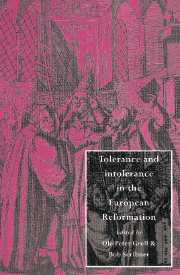Book contents
- Frontmatter
- Contents
- List of contributors
- Preface
- Dedication
- 1 Introduction
- 2 The travail of tolerance: containing chaos in early modern Europe
- 3 Preconditions of tolerance and intolerance in sixteenth-century Germany
- 4 Heresy executions in Reformation Europe, 1520–1565
- 5 Un roi, une loi, deux fois: parameters for the history of Catholic-Reformed co-existence in France, 1555–1685
- 6 Confession, conscience and honour: the limits of magisterial tolerance in sixteenth-century Strassburg
- 7 One Reformation or many? Protestant identities in the later Reformation in Germany
- 8 Toleration in the early Swiss Reformation: the art and politics of Niklaus Manuel of Berne
- 9 Tolerance and intolerance in sixteenth-century Basle
- 10 Exile and tolerance
- 11 The politics of toleration in the Free Netherlands, 1572–1620
- 12 Archbishop Cranmer: concord and tolerance in a changing Church
- 13 Toleration for Catholics in the Puritan revolution
- 14 The question of tolerance in Bohemia and Moravia in the age of the Reformation
- 15 Tolerance and intolerance in sixteenth-century Hungary
- 16 Protestant confessionalisation in the towns of Royal Prussia and the practice of religious toleration in Poland-Lithuania
- Index
6 - Confession, conscience and honour: the limits of magisterial tolerance in sixteenth-century Strassburg
Published online by Cambridge University Press: 07 December 2009
- Frontmatter
- Contents
- List of contributors
- Preface
- Dedication
- 1 Introduction
- 2 The travail of tolerance: containing chaos in early modern Europe
- 3 Preconditions of tolerance and intolerance in sixteenth-century Germany
- 4 Heresy executions in Reformation Europe, 1520–1565
- 5 Un roi, une loi, deux fois: parameters for the history of Catholic-Reformed co-existence in France, 1555–1685
- 6 Confession, conscience and honour: the limits of magisterial tolerance in sixteenth-century Strassburg
- 7 One Reformation or many? Protestant identities in the later Reformation in Germany
- 8 Toleration in the early Swiss Reformation: the art and politics of Niklaus Manuel of Berne
- 9 Tolerance and intolerance in sixteenth-century Basle
- 10 Exile and tolerance
- 11 The politics of toleration in the Free Netherlands, 1572–1620
- 12 Archbishop Cranmer: concord and tolerance in a changing Church
- 13 Toleration for Catholics in the Puritan revolution
- 14 The question of tolerance in Bohemia and Moravia in the age of the Reformation
- 15 Tolerance and intolerance in sixteenth-century Hungary
- 16 Protestant confessionalisation in the towns of Royal Prussia and the practice of religious toleration in Poland-Lithuania
- Index
Summary
Proponents of dozens of conflicting visions of reformed Christianity coexisted uneasily in sixteenth-century Strassburg, forcing debate on the permissible limits of religious diversity. Thanks to the astonishing variety of opinion in Strassburg, to its magistrates' reluctance to punish people for their beliefs (and also perhaps to the loss of most of its judicial records), Strassburg regularly appears in general histories of the sixteenth century as a model of religious tolerance towards individuals, or even toleration of faiths, an exceptional polity in an age that is often thought rarely to have hesitated before killing dissenters. While the rarity of executions for religious crimes does point to a relatively tolerant policy, Strassburg's Reformation history encompasses a well-documented array of other forms of intolerance: official and familial bullying of nuns in the 1520s and again in the 1590s, the pursuit and harassment of suspected Anabaptists that peaked between the mid-1520s and the early 1540s, the demonstrations against Catholic services and priests in the 1540s and 1550s, and anti-Calvinist displays of the 1580s and 1590s. Coercion was everywhere part of the sixteenth-century's religious politics, and recognition of this has moved historians of Strassburg to become increasingly attentive to discord and repression in the city. For the city's secular rulers, arbiters of repression or tolerance, diversity of religious opinion constituted a complex political problem that threatened to bring their new duties to defend the city's evangelical confessions into conflict with more traditional measures of their honour as magistrates.
Officially Catholic until 1529, Strassburg's magistrates thereafter maintained a collective identity as evangelicals.
- Type
- Chapter
- Information
- Tolerance and Intolerance in the European Reformation , pp. 94 - 107Publisher: Cambridge University PressPrint publication year: 1996
- 1
- Cited by



